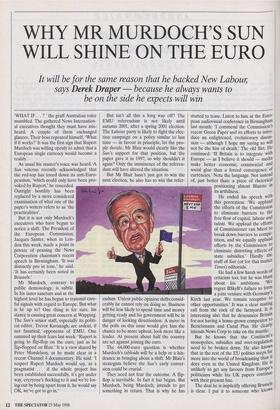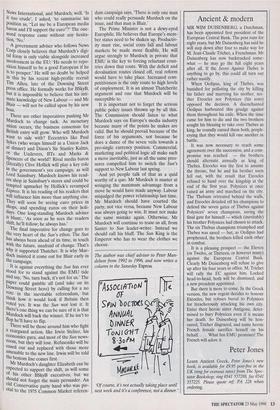WHY MR MURDOCH'S SUN WILL SHINE ON THE EURO
It will be for the same reason that he backed New Labour,
says Derek Draper — because he always wants to
be on the side he expects will win
`WHAT IF. . ? ' the gruff Australian voice mumbled. The gathered News Internation- al executives thought they must have mis- heard. A couple of them exchanged glances. Their boss repeated himself, 'What if it works?' It was the first sign that Rupert Murdoch was willing openly to admit that a European single currency would become a reality.
But it is not only Murdoch's executives who have begun to notice a shift. The President of the European Commission, Jacques Santer, when in Lon- don this week, made a point in private of praising the News Corporation chairman's recent speech in Birmingham. 'It was distinctly pro in tone,' he said. `It has certainly been noted in Brussels.'
Mr Murdoch, contrary to public demonology, is subtle. In his inner sanctum and at the highest level he has begun to transmit care- ful signals with regard to Europe. But what is he up to? One thing is for sure, his stance is causing great concern at Wapping. The Sun's senior staff, especially its politi- cal editor, Trevor Kavanagh, are ardent, if not fanatical, opponents of EMU. One summed up their fears last week: 'Rupert is going to flip-flop on the euro, just as he flip-flopped on Blair.' It is a view shared by Peter Mandelson, as he made clear in a recent Channel 4 documentary. He said: 'I suspect Rupert Murdoch would say, as a pragmatist . . . if the whole project has been established successfully, it's got under way, everyone's flocking to it and we're los- ing out by being apart from it, he would say OK, we've got to go in.' But isn't all this a long way off? The EMU referendum is not likely until autumn 2001, after a spring 2001 election. The Labour party is likely to fight the elec- tion campaign on a policy similar to last time — in favour in principle, let the peo- ple decide. Mr Blair would clearly like the Sun's support for that position, but the paper gave it in 1997, so why shouldn't it again? Only the imminence of the referen- dum will have altered the situation.
But Mr Blair hasn't just got to win the next election, he also has to win the refer- endum. Unless public opinion shifts consid- erably he cannot rely on doing so. Business will be less likely to spend time and money getting ready and his government will be in danger of looking directionless. A move in the polls on this issue would give him the chance to be more upbeat, look more like a leader. At present about half the country are set against joining the euro.
The 64,000-euro question is whether Murdoch's tabloids will be a help or a hin- drance in bringing about a shift. Mr Blair's strategists believe the Sun's early conver- sion could be crucial.
They need not fear the outcome. A flip- flop is inevitable. In fact it has begun. But Murdoch, being Murdoch, intends to get something in return. That is why he has started to tease. Listen to him at the Euro- pean audiovisual conference in Birmingham last month: commend the Commission's recent Green Paper and its efforts to intro- duce an enlightened, evolutionary discus- sion — although I hope my saying so will not be the kiss of death.' The old flirt. He continued: 'If Britain is to integrate with Europe — as I believe it should — media make better economic, commercial and social glue than a forced convergence of currencies.' Note the language. Not instead of, just better than: a piece of rhetorical positioning almost Blairite 01 its artfulness.
He ended his speech with this peroration: 'We applaud the efforts of the Commission to eliminate barriers to the free flow of capital, labour and talent. We applaud the efforts of Commissioner van Miert to break down barriers to compe- tition, and we equally applaud efforts by the Commission to eliminate distorting effects of state subsidies.' Hardly the stuff of Sun (or for that matter Times) editorials. He had a few harsh words of criticism too, but he was blunt about his ambitions. 'We regret BSkyB's failure to for a joint venture with Germany s year. We remain receptive, to other opportunities.' It was a clear mating call from the cock of the farmyard. It is interesting also that he denounces Britain for not having a home-grown competitor to Bertelsmann and Canal Plus. He clearly intends News Corp to take on the mantle. But he knows that the Continent's monopolies, subsidies and over-regulation need to be broken down. He also knows that in the rest of the EU politics seeps far more into the world of broadcasting than it does even in the United Kingdom. He 1s unlikely to get any favours from Europe's politicians while his UK papers continue with their present line. The deal he is implicitly offering Brussels is clear. I put it to someone who knows Kirch last News International, and Murdoch, well. 'Is it too crude', I asked, 'to summarise his position as, "Let me be a European media baron and I'll support the euro"?' The one- Word response came without any hesita- tion, No., A government adviser who follows News Corp closely believes that Murdoch's digi- tal foray is only viable alongside increased involvement in the EU: 'He needs to repo- sition himself to be a good European if he is to prosper.' He will no doubt be helped in this by his recent high-profile recruit Tim Allen, late of the Downing Street press office. He formally works for BSkyB, but it is impossible to believe that his inti- mate knowledge of New Labour — and Mr Blair — will not be called upon by his new boss.
There are other imperatives pushing Mr Murdoch to change tack. As monetary onion occurs, the business consensus for British entry will grow. Who will Murdoch want to side with? Eccentrics like Paul Sykes (who wraps himself in a Union Jack at dinner) and Dixon's Sir Stanley Kalms, or the Unilevers, BTs and Marks & Spencers of the world? Rival media baron (literally) Clive Hollick will play a key role in the government's yes campaign, as will Lord Sainsbury. Murdoch knows his read- ers shop in Sainsbury's stores and could be tempted upmarket by Hollick's revamped Express. It is his reading of his readers that will influence him more than anything else. They will soon be seeing euro prices in shops, and spending euros on their holi- days. One long-standing Murdoch adviser is blunt:, 'As soon as he sees the readers shift, he'll follow; he always has.' The final imperative for change goes to the very heart of the Sun's ethos. The Sun has always been ahead of its time, in touch with the future, unafraid of change. That's why it supported Thatcher. It is why Mur- doch insisted it come out for Blair early in the campaign. It is against everything the Sun has ever stood for to stand against the EMU tide and say, 'No, turn back, it's not for us.' The paper could gamble all (and take on its Downing Street hero) by calling for a no vote in the inevitable referendum, but think how it would look if Britain then voted yes. It was the Sun wot lost it. It there's one thing we can be sure of it is that Murdoch will back the winner. If he isn't to flop he'll have to flip. There will be those around him who fight a rearguard action, like Irwin Stelzer, his economics guru, and most of the Sun news- room, but they will lose. Refuseniks will be eased out and replaced with those more amenable to the new line. Irwin will be told the bottom line comes first. Mr Murdoch's daughter Elizabeth can be expected to support the shift, as will some of his other BSkyB executives, but we should not forget the main persuader. An old Conservative party hand who was piv- otal to the 1975 Common Market referen- dum campaign says, 'There is only one man who could really persuade Murdoch on the issue, and that man is Blair.'
The Prime Minister is not a dewy-eyed Europhile. He believes that Europe's mem- ber states need to be shaken up. Productiv- ity must rise, social costs fall and labour markets be made more flexible. He will argue strongly to Murdoch in private that EMU is the key to forcing reluctant coun- tries down that route. With the deficit and devaluation routes closed off, real reform would have to take place. Increased com- petitiveness is the only route to high levels of employment. It is an almost Thatcherite argument and one that Murdoch will be susceptible to.
It is important not to forget the serious public policy issues thrown up by all this. The Commission should listen to what Murdoch says on Europe's media industry because many of the points he makes are valid. But he should prevail because of the force of his arguments, not because he does a dance of the seven veils towards a pro-single currency position. Commercial, marketing and political logic all make such a move inevitable, just as all the same pres- sures compelled him to switch the Sun's support to New Labour last spring.
And yet people talk of that as a quid worthy of a quo. Mr Murdoch is master at wringing the maximum advantage from a move he would have made anyway. Labour misjudged the power relationship last time. Mr Murdoch should have courted the party, not vice versa, because New Labour was always going to win. It must not make the same mistake again. Otherwise, Mr Murdoch will continue to tease us all, from Santer to Sun leader-writer. Instead we should call his bluff. The Sun King is the Emperor who has to wear the clothes we choose.
The author was chief adviser to Peter Man- delson from 1992 to 1996, and now writes a column in the Saturday Express `Of course, it's not actually taking place until next week and it's a conference, not a dinner.'



































































 Previous page
Previous page